Agreements about cooperation National Academy of Statistics, Accounting and Auditing (NASАA) with other educational institutions assume:
- participation in the design and implementation of joint projects;
- academy scientists participation in international conferences, seminars and summer schools;
- scientific internships and reading lectures abroad;
- joint scientific and educational publications;
- exchange of students and postgraduates;
- strengthening friendly relations of inter-university cooperation;
- establishment of fruitful cooperation in education and researches;
- invitations or exchange of lecturers and researchers (including postgraduates) who are engaged in educational or research activities;
- joint organization of academic events and publications;
- exchange of scientific and pedagogical documentation.
The development and intensification of international relations will facilitate formation of a European dimension of higher education at the Academy, a deeper acquaintance with modern achievements of European researchers and educators, increasing scientific capacity of lecturers, postgraduates and students, increasing their skills and entering NASАA into the European educational space.
Partners
Groupe des Ecoles Nationales d’Economie et Statistique, France
 The Group of Schools of National Economics and Statistics (GENES) is the current public institution of higher education and research of the French Ministry of Economy and Finance, operating under the technical supervision of the French National Institute of Statistics (INSEE).
The Group of Schools of National Economics and Statistics (GENES) is the current public institution of higher education and research of the French Ministry of Economy and Finance, operating under the technical supervision of the French National Institute of Statistics (INSEE).
Akademia WSB, Poland
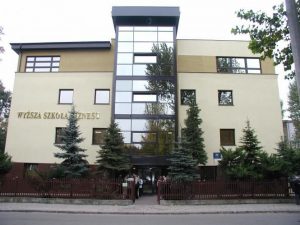 Akademia WSB (Poland) was founded in 1995 in Dąbrowa Górnicza (Poland). And since then, it has been constantly responding to the needs of the education market. It offers a competitive and modern learning environment. During the training, you can use laboratories and training facilities. In addition, studying at the university is not limited only to theory – you can test your knowledge in practice and real life situations.
Akademia WSB (Poland) was founded in 1995 in Dąbrowa Górnicza (Poland). And since then, it has been constantly responding to the needs of the education market. It offers a competitive and modern learning environment. During the training, you can use laboratories and training facilities. In addition, studying at the university is not limited only to theory – you can test your knowledge in practice and real life situations.
The Akademia WSB in Dąbrowa Górnicza also provides an opportunity to learn about Polish culture and how Polish students live and spend their free time.
Over the past few years, the university has been involved in many international projects. This number is growing every year, and Akademia WSB makes every effort to offer its students programs that meet their interests and needs.
Currently, there are 6000 students studying at the Graduate School of Business, and this number is constantly growing.
WSB MERITO University Poznań, Poland
 WSB MERITO is the largest group of higher education institutions in Poland in the field of business education. More than 20 years of experience in training specialists, as well as cooperation with representatives of the labor market, have contributed to the fact that the proposed areas of training and specialties meet the current needs of the market, and the diploma obtained facilitates the search for the desired job.
WSB MERITO is the largest group of higher education institutions in Poland in the field of business education. More than 20 years of experience in training specialists, as well as cooperation with representatives of the labor market, have contributed to the fact that the proposed areas of training and specialties meet the current needs of the market, and the diploma obtained facilitates the search for the desired job.
WSB universities are educational institutions that have a wide range of specialties at the same time as an optimally organized educational process, which allows students to combine study with work.
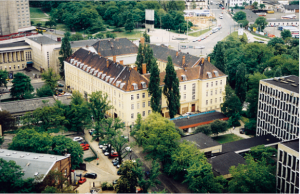 In the 2014 ranking of the Polish weekly Wprost, WSB Universities was recognized by employers as the best group of non-state higher education institutions in Poland.
In the 2014 ranking of the Polish weekly Wprost, WSB Universities was recognized by employers as the best group of non-state higher education institutions in Poland.
The Poznań School of Banking is the largest non-public school in Poland, which was founded in 1994 and currently has 210,000 students and graduates.
The educational process is organized in such a way that each student can find time for studying, working, and developing their own hobbies and interests.
The full-time staff of WSB Universities is more than 100 scientific, pedagogical and pedagogical staff. The best teachers of Polytechnic universities, as well as partner foreign universities, are also involved in cooperation.
A significant number of classes at WSB Universities are conducted by practicing teachers who willingly share their wealth of professional experience with students. Among them are directors and employees of banks, real estate agencies, financial control authorities, customs services, creative directors, specialists in PR, trade, international finance, heads of marketing departments, experts of consulting firms, owners of travel agencies and travel agencies.
WSB cooperates with international scholarship and grant programs.
University of Rzeszow, Poland
 University of Rzeszów (Uniwersytet Rzeszowski), founded on September 1, 2001, is in the ranking of the best educational institutions and is considered one of the most prestigious educational institutions in Poland.
University of Rzeszów (Uniwersytet Rzeszowski), founded on September 1, 2001, is in the ranking of the best educational institutions and is considered one of the most prestigious educational institutions in Poland.
At 10 faculties, today about 22 thousand students study here. The staff of teachers and researchers is more than 2000 people.
The university actively cooperates with various scholarship and grant programs: ERASMUS and CEEPUS, the Alexander von Humboldt Foundation, DAAD, etc.
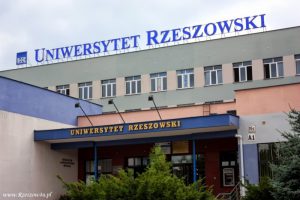 The support and development of cooperation between the University of Rzeszow and foreign higher education institutions enables students to be actively involved in scientific activities, receive grants and scholarships for study, undergo internships, take part in seminars and conferences abroad.
The support and development of cooperation between the University of Rzeszow and foreign higher education institutions enables students to be actively involved in scientific activities, receive grants and scholarships for study, undergo internships, take part in seminars and conferences abroad.
Students are given the opportunity to study in Polish and English.
National Institute of Statistics and Applied Economics, Rabat, Morocco
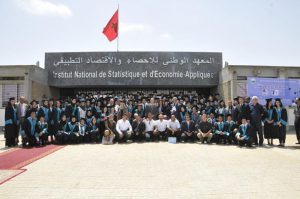 The National Institute of Statistics and Applied Economics (INSEA) is one of the oldest economic higher education institutions in Morocco and is still one of the most prestigious Moroccan universities. Located in Rabat, it was started in 1961. Supported by the Economic Commission for Africa (ECA)
The National Institute of Statistics and Applied Economics (INSEA) is one of the oldest economic higher education institutions in Morocco and is still one of the most prestigious Moroccan universities. Located in Rabat, it was started in 1961. Supported by the Economic Commission for Africa (ECA)
INSEA provides training that places equal emphasis on statistics and economic analysis, and offers training in the areas of analysis, finance, demographic and operational studies. It is the first school to offer computer-assisted learning nationally and developed the first computer for the kingdom and in 1974.
Graduates of INSEA possess skills that allow them to carry out analysis and economic forecasting, the development of information and statistical systems, but they are also capable of developing models to improve complex market analysis, improve target marketing and measure risk in various fields of activity.
In addition, training at INSEA is not limited to the technical aspects of design, but also extends to management, communication and a good knowledge of the socio-economic and political situation. INSEA graduates are expected to play a strategic role at various stages of the economic and social development process, pursuing careers in the public sector, local communities and the private sector: insurance companies, banking companies, large companies and national multinationals.
Ovidius University of Constanta, Romania
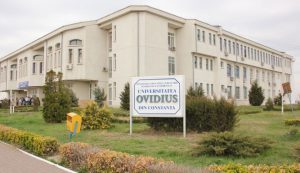 Ovidius University is the largest European university on the Black Sea. Located in the city of Constanta, the largest city in Dobruja and southern Romania, the university is located in an economically powerful region that represents a cultural bridge between East and West, the eastern gateway to the European Union.
Ovidius University is the largest European university on the Black Sea. Located in the city of Constanta, the largest city in Dobruja and southern Romania, the university is located in an economically powerful region that represents a cultural bridge between East and West, the eastern gateway to the European Union.
Ovidius University was a public institution of higher education founded in 1961. In 1990, it became a comprehensive university, with bachelor’s, master’s and doctoral programs at high European quality standards. The university has received a high degree of protection from national and international accreditation institutions. With over 15,000 students, Ovidius University is the largest European university on the Black Sea.
The university chose the name of the Roman poet Publius Ovidius Naso, who spent the last years of his life in the ancient Greek colony of Tomis. The patron saint of the university left an enduring legacy to the whole world, a legacy that teaches through the myth of Pygmalion Metamorphoses, of passion and love, of creation and transformation.
Ovidius University is a comprehensive, multicultural institution of higher education whose mission is to create, maintain and disseminate knowledge to society through education, research and artistic creativity according to European standards. The university is actively involved in the community and has an impact on the entire Black Sea region, Europe and beyond.
Stefan Cel Mare University in Suceava, Moldova
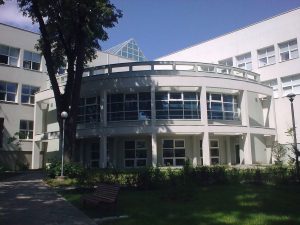 The Stefan Cel Mare University of Suceava is one of the fastest-growing universities in the Eastern European region, providing higher education at high-quality standards at a relatively low cost. It is one of the few universities in this region with a comprehensive curriculum comprising more than 100 undergraduate, graduate, doctoral, and postgraduate programs from all five tertiary faculties (Art History, Engineering and Computer Science, Natural Sciences, Natural Sciences, and Social Sciences). A unique educational outpost dating back almost half a century, the university’s transnational platform aims to discover, preserve and disseminate knowledge while promoting basic European principles, such as unity through diversity, in an area where the trust and identity of the European Union needs to be strengthened and expanded.
The Stefan Cel Mare University of Suceava is one of the fastest-growing universities in the Eastern European region, providing higher education at high-quality standards at a relatively low cost. It is one of the few universities in this region with a comprehensive curriculum comprising more than 100 undergraduate, graduate, doctoral, and postgraduate programs from all five tertiary faculties (Art History, Engineering and Computer Science, Natural Sciences, Natural Sciences, and Social Sciences). A unique educational outpost dating back almost half a century, the university’s transnational platform aims to discover, preserve and disseminate knowledge while promoting basic European principles, such as unity through diversity, in an area where the trust and identity of the European Union needs to be strengthened and expanded.
The university is located in the beautiful and cosmopolitan land of Bukovina, the university is surrounded by the highest density of UNESCO monuments from this part of Europe, monuments of precious art, great spiritual life and rich folklore traditions, giving students excellent opportunities for extracurricular activities.
The university’s ability to support regional development at the national level within the North-Eastern region, as well as at the transnational level through the close partnership between Ukraine and the Republic of Moldova, also stands out.
The Stefan Cel Mare University of Suceava is a Romanian higher education institution located at the confluence of important European cultures and civilizations. Its mission is to preserve and develop cultural diversity, strengthen relations with Romanians across borders by encouraging new bilateral agreements and partnerships with universities in the European Union, as well as with higher education institutions from Eastern European countries, that are not part of the EU.
Warsaw School of Economics, Poland
 The Warsaw School of Economics was founded in 1906 by August Zieliński as the first economic university in Poland.
The Warsaw School of Economics was founded in 1906 by August Zieliński as the first economic university in Poland.
About 13,700 students are enrolled in the school for bachelor’s and master’s degree programs, more than 700 are studying for a doctorate and more than 4,900 are enrolled in other postgraduate courses. The Warsaw School of Economics employs more than 790 faculty members and researchers.
Students of the Warsaw School of Economics represent almost 60 countries.
The Warsaw School of Economics is an innovative economic university that develops intellectual potential and creates leaders in response to the challenges of the future. It is an influential center for research, new ideas and initiatives conducted by the academic community and alumni, as well as representatives of business and public administration. As an autonomous and socially responsible university Warsaw School of Economics encourages ethical citizenship through its teaching, research, and social participation activities.
Alexander Dubček University in Trenčín, Slovakia
Alexander Dubček University in Trenčen was founded in 1997 by the decision of the National Council of the Slovak Republic and is one of the youngest universities in the Slovak Republic.
In accordance with the Law on Higher Education Institutions, the basic components of the university were established: the Faculty of Special Technologies, the Faculty of Mechatronics, the Faculty of Industrial Technology in Pukhov and the Faculty of Socio-Economic Relations. Later, in 2004, the Institute of Health and Nursing was established for health education and research, and in 2006, it was transformed into the Faculty of Public Health.
In 2002, it was transformed into a public higher education institution under the Higher Education Act.
Since 2016, the University has included the Center for Functional and Surface Functional Glasses (FunGlass), which is one of the 10 successful projects to establish a Center of Excellence for the European Framework Programme for Research and Innovation Horizon 2020. The general intention was to build an internationally recognized center. Specialization — excellent research in the field of glasses with specific properties (fluorescent, electrical, sorption) and the functionalization of the surface of ordinary glasses, the modification of their properties and the allocation of new functionalities with the application, e.g. in energy, automotive, and healthcare.
National School of Statistics and Information Analysis (ENSAI), France
 Founded in 1994, the National School of Statistics and Information Analysis of the City of Rennes (ENSAI) is a public higher education institution. It is the only engineering school entirely dedicated to statistical engineering and information processing. The school is a member of the Congrès des Grandes Écoles (CGE).
Founded in 1994, the National School of Statistics and Information Analysis of the City of Rennes (ENSAI) is a public higher education institution. It is the only engineering school entirely dedicated to statistical engineering and information processing. The school is a member of the Congrès des Grandes Écoles (CGE).
WSHIU Akademia Nauk Stosowanych, Poznan, Poland
 WSHIU Akademia Nauk Stosowanych (formerly Wyższa Szkoła Handlu i Usług w Poznaniu) is the only non-state university in Poland founded by an economic self-government organization. It was founded in 1997 by the Wielkopolska Association of Trade and Services in Poznań.
WSHIU Akademia Nauk Stosowanych (formerly Wyższa Szkoła Handlu i Usług w Poznaniu) is the only non-state university in Poland founded by an economic self-government organization. It was founded in 1997 by the Wielkopolska Association of Trade and Services in Poznań.
Maintains close contact with business practice as an integral part of education, works closely with the Higher Council of Trade and Services Associations and many organizations, foundations, associations, as well as with the government and local administration, many banks, companies and institutions, as well as with the fire service, the penitentiary service, the police and the army.
In its activities, the University is guided by the principles of freedom of conscience, freedom of teaching and research. In 2022, the University received the status of the Academy of Applied Sciences.
University of the Third Age in Hromadka, Poland
Any resident of the Gromadka commune, regardless of education, who has completed his professional career (pensioner, disability pensioner, as well as unemployed) and wants to expand his knowledge, develop his interests and take an active part in the cultural life of the commune, can become a student of the University of the Third Age in Hromadka.
The University of Constantine the Philosopher in Nitra, Slovakia
 The University of Constantine the Philosopher in Nitra is a public university-type higher education institution in the city of Nitra, Slovakia. The University developed the Cyril and Methodius traditions and bears the name of St. Cyril (827-889), who played a significant role, among other things, in the history of Slovakia. The Constantine the Philosopher University in Nitra offers educational, scientific, and artistic programs.
The University of Constantine the Philosopher in Nitra is a public university-type higher education institution in the city of Nitra, Slovakia. The University developed the Cyril and Methodius traditions and bears the name of St. Cyril (827-889), who played a significant role, among other things, in the history of Slovakia. The Constantine the Philosopher University in Nitra offers educational, scientific, and artistic programs.
The University, in addition to training teachers for primary and secondary schools, prepares future social workers and specialists for cultural institutions. As well as political scientists, catechists, journalists, archaeologists, historians, museologists, biologists, ecologists, mathematicians, physicists, computer scientists, psychologists, gemologists, etc.
The Faculty of Commercial Sciences and Business Sciences, Celje, Slovenia
 The Faculty of Commercial Sciences and Business Sciences was founded by the educational company Abitura d.o.o. Celje. Its mission is to provide business, public and third sector organizations with highly qualified economists capable of performing important work in various organizations. Working in Celje, the Faculty aims to provide higher education opportunities for students from the Celje-Savinj region and to interest them in unique study programs that will also attract students to other study centers of the Faculty of Commercial Sciences and Business Sciences throughout Slovenia. In order to ensure the appropriate orientation of the programs, the Faculty constantly and systematically develops high-quality cooperation with potential employers of students, its research activities are focused mainly on the needs and requirements of end users.
The Faculty of Commercial Sciences and Business Sciences was founded by the educational company Abitura d.o.o. Celje. Its mission is to provide business, public and third sector organizations with highly qualified economists capable of performing important work in various organizations. Working in Celje, the Faculty aims to provide higher education opportunities for students from the Celje-Savinj region and to interest them in unique study programs that will also attract students to other study centers of the Faculty of Commercial Sciences and Business Sciences throughout Slovenia. In order to ensure the appropriate orientation of the programs, the Faculty constantly and systematically develops high-quality cooperation with potential employers of students, its research activities are focused mainly on the needs and requirements of end users.
Mediterranean University, Podgorica, Montenegro
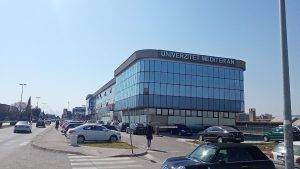 Mediterranean University is a private institution of higher education in Montenegro in the capital, the city of Podgorica. It was founded on May 30, 2006. It is the first private university founded in Montenegro and organized into 6 faculties. The university is a member of the Balkan Universities Network.
Mediterranean University is a private institution of higher education in Montenegro in the capital, the city of Podgorica. It was founded on May 30, 2006. It is the first private university founded in Montenegro and organized into 6 faculties. The university is a member of the Balkan Universities Network.
The Center for Research and Consulting on Projects has been established at the University. Through project work and teacher training, the university strengthens the connection between the academic and business environment of Montenegro. Adopting European standards in teaching and research and through cooperation with many international higher education institutions, the university is actively involved in the cultural and economic development of Montenegro and its integration into European and world trends.
Mediterranean University is part of the Atlas Group, one of the leading corporations in Southeast Europe, which plays a crucial role in the implementation of investment activities and projects. The University maintains and develops contacts with other universities in accordance with mutually harmonized and signed bilateral agreements, which include: exchange of teachers and students, joint research projects, participation in seminars and other academic meetings, professional training programs and other activities that promote academic cooperation.
Donja Gorica University, Montenegro
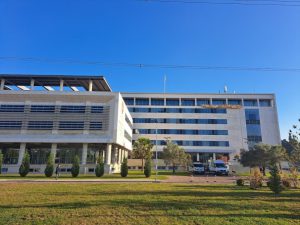 Donja Gorica University was founded in 2007. It is the largest private university in Montenegro. The university is a member of the Balkan Universities Network.
Donja Gorica University was founded in 2007. It is the largest private university in Montenegro. The university is a member of the Balkan Universities Network.
Training is conducted at the following faculties: Law, Polytechnic, International Economics, Finance and Business; Information Systems and Technologies, Food Technology, Food Safety and Ecology; Arts. All conditions for studying and living for students have been created here: classrooms and laboratories are equipped with modern equipment, libraries with traditional paper-based books and e-books are at the service of students.
A 3D laboratory has been created at the university to teach students modern digital technologies. Based on the knowledge gained, they not only find a job, but also open their own business in the IT industry. Seminars are held in the 3D laboratory, diplomas and PhD theses are defended. This is a platform for the implementation of student projects within the framework of the course “Entrepreneurship and Innovation”, which is mandatory at all faculties of the University of Donja Gorica.
Varna Free University of Chernorizets Hrabr, Bulgaria
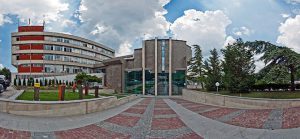 Varna Free University of Chernorizets Khrabr is the largest private university in Bulgaria, located in Varna (near the resort of Golden Sands). It was founded in 1991 and received the status of a higher education institution in 1995.
Varna Free University of Chernorizets Khrabr is the largest private university in Bulgaria, located in Varna (near the resort of Golden Sands). It was founded in 1991 and received the status of a higher education institution in 1995.
The University offers full-time and part-time studies in 35 specialties, including “Economic Management”, “Social Activities”, “Economics”, “International Economic Relations”, “Public Administration”, “Political Science”, “International Relations”, “Corporate Security Management”, “Construction of Buildings and Structures”, “Fashion”, “Textiles”, “Journalism”, “European Studies”, etc.



